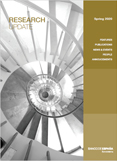
Series: Featured research.
Author: Mario Izquierdo, Enrique Moral-Benito, Elvira Prades and Javier Quintana.
Full document
Summary
How does a shock in a specific sector propagate along the global production network? What is the aggregate impact when a common shock affects simultaneously the same industry across different countries? In this work we provide a useful framework to account for several policy-relevant scenarios, such as changes in environmental regulations or the implementation of new technologies. For that purpose, we highlight the importance of departing from standard linear models that assume perfect input substitution (i.e. unitary elasticity). We combine a theoretical framework of production networks with arbitrary elasticities of substitution (Baqaee & Farhi, 2019) and we make use of World Input-Output Database (WIOD) to account for international linkages. This setting illustrates how, in the presence of production input complementarities, the interaction between simultaneous sector-specific shocks has significant non-linear effects on sectoral composition and aggregate output. The aggregate impact of negative (positive) shocks gets significantly amplified (mitigated) when they affect simultaneously industries with strong production linkages. Our results show that ignoring production complementarities leads to vastly underestimating the aggregate consequences of regulatory or technological shocks in industries like chemicals or vehicle manufacturing. In contrast, simultaneous shocks to services industries are well accounted for by standard measures.

